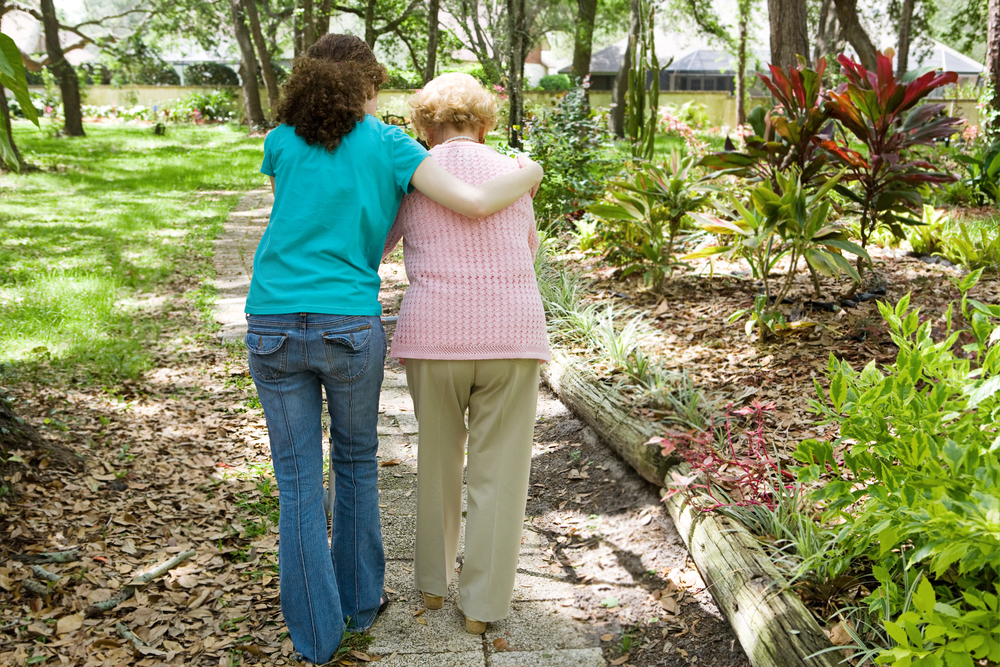
According to AARP and the National Caregiver Alliance , the average caregiver is a 49 year old woman caring for a 69 year old relative. In addition to being a caregiver she is married with her own children and is working. The study says the caregiving role lasts an average of 4 years. Being a caregiver can be rewarding, stressful, exhausting, and/or healing. Assuming the title of caregiver on top of balancing your work and other family commitments leaves you little time for yourself. The fact is if you don’t make time to recharge it will impact your relationships, work, school, as well as your ability to be an effective caregiver.
Caregivers sometimes feel isolated and alone. It is important to recognize that the impact of caregiving can cause a cascade of side effects. Some of these symptoms are universally experienced by caregivers. Take a moment to do some self examination. See which of these common physical and emotional symptoms you may be experiencing in your role as a caregiver:
Physical Symptoms
- Headaches
- Stomach aches or digestive issues
- Loss of sleep
- Loss of appetite or inability to make time to eat properly
- Back pain or pain/aches in other areas of your body
- loss of energy
- reduced concentration
- increased use of alcohol or drugs/prescription medications
Emotional Symptoms:
- guilt
- depression/sadness
- stress
- anxiety
- anger
- short temper, lack of patience
The good news is that now that you have identified the symptoms that apply to you. There are things you can and should do to maintain your own physical and emotional well being. Please note that you are not alone in experiencing any or all of these symptoms.
Your most important job as a caregiver includes taking care of yourself. It may be the hardest job a caregiver has to do. Here are some suggestions that will enhance your caregiver capabilities. The information below explains why these actions are helpful. Engaging in these activities will enhance your physical and emotional well being:
- Exercise-It can be a walk,exercise video, climbing up and down steps, a swim, gardening. Try carving out 10-15 minutes a day or every other day. Exercise releases endorphins that lift your mood. It also helps blood and oxygen flow throughout your body. In addition it burns calories. (emotional and physical health)
- Eating Well-good nutrition gives you more energy and endurance. Eating meals that are high in calories or carbohydrates can make you feel sleepy, low energy. Drinking lots of water flushes your system out and reduces toxins. Good nutrition and hydration can help reduce illness (physical health)
- Sleep/rest time-This also can be challenging. It is hard to turn off your mind when you go to bed. Taking a nap when the person you care caring for is resting is helpful. Just laying down and resting your body and mind helps. Go to bed at a reasonable time and create a routine that offers maximum opportunities for rest. (physical and mental health)
- Be realistic about what you can and can’t do-Do a self inventory and recognize your limits. Maybe you can’t physically lift and transfer someone multiple times a day. Maybe you can’t be available every day. It may be too frustrating to be with someone daily who doesn’t recognize or appreciate your efforts. Don’t beat yourself up for what you cannot do. Focus on the contributions you make as a caregiver and celebrate those actions whether they are acknowledged or not. (physical and emotional health)
- Gather information-Talk to a doctor about the medical issues associated with the person you are caring for. Find out what you should expect in terms of health issues, necessary medical care, and time frames associated with the illness. Talk to others who have loved ones with similar diagnosis. Go to chat rooms or support groups to exchange ideas and information from them. (emotional health)
- Ask for help-There is no shame in asking others for help or incorporating a respite plan in your role as caregiver. Seek out other family, friends, healthcare professionals to offer support. Try recruiting from local churches or other religious centers. Seek out local Adult Day Care programs or respite care programs as alternatives to prevent burnout. (physical and emotional health)
- Find a kindred spirit-There will be times when you need to talk candidly to someone you trust and respect to just vent, get support, or bounce ideas off of. If you have nobody in your life to turn to seek professional psychological support from someone specializing in family/aging issues. Use this other person to help you realistically assess what you can and can’t do. (emotional health)
- Enjoy some time for yourself-This is another challenging assignment. It is imperative that you recharge emotionally. This is guilt free time for you. Do something that makes you laugh or smile. Treat yourself to time out with friends or loved ones. Try going to a movie, get a massage, read a great book, take a long bath. Fill in the blank…________ helps me relax and feel good. (emotional health)
The hardest part of being a caregiver is giving yourself permission to take care of yourself. We tell ourselves we don’t have the time. We feel that pull in multiple directions every day in our attempts to balance the responsibilities and obligations we have in our lives. The tasks and people associated with these responsibilities also can enrich our lives. Caregiving can offer enormous rewards in conjunction with the stresses and challenges that arise. Your being good to yourself can enhance the experience for all concerned.
LEARN TO LOVE YOUR LIFE AGAIN
 Do you feel like you need to hit the REFRESH button on your life? Download our free guide and begin to create your best life yet!
Do you feel like you need to hit the REFRESH button on your life? Download our free guide and begin to create your best life yet!


